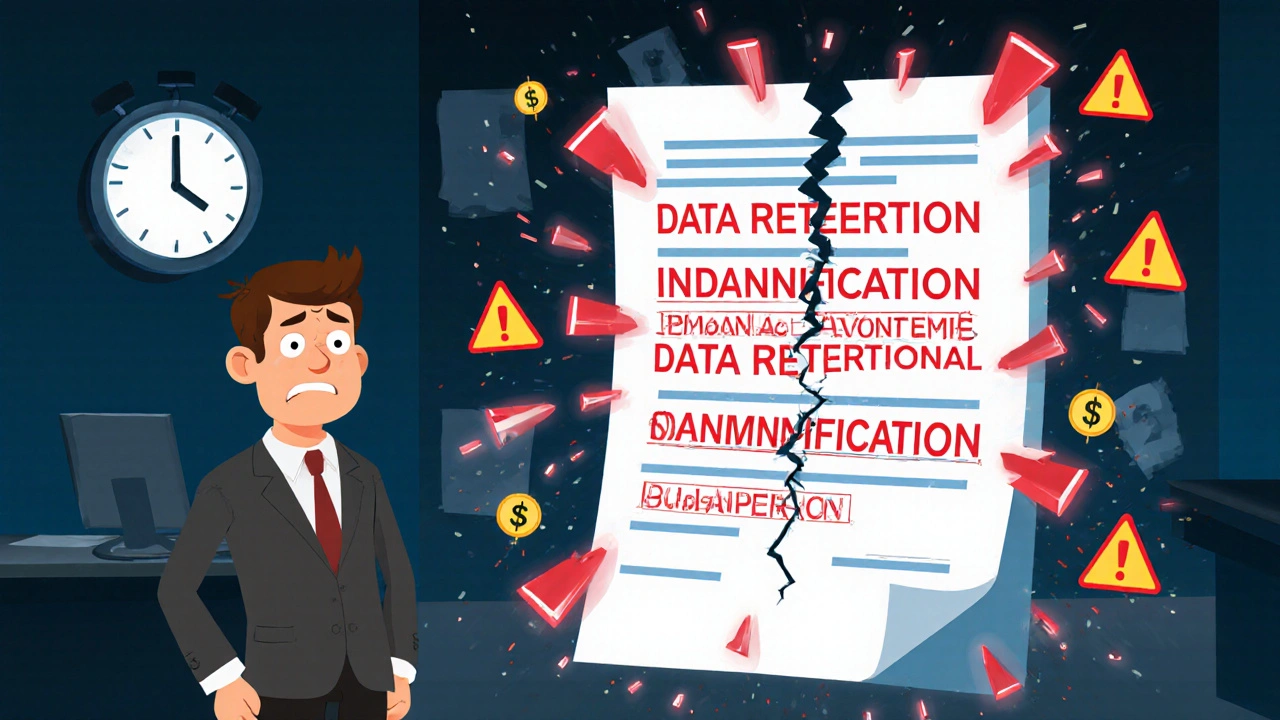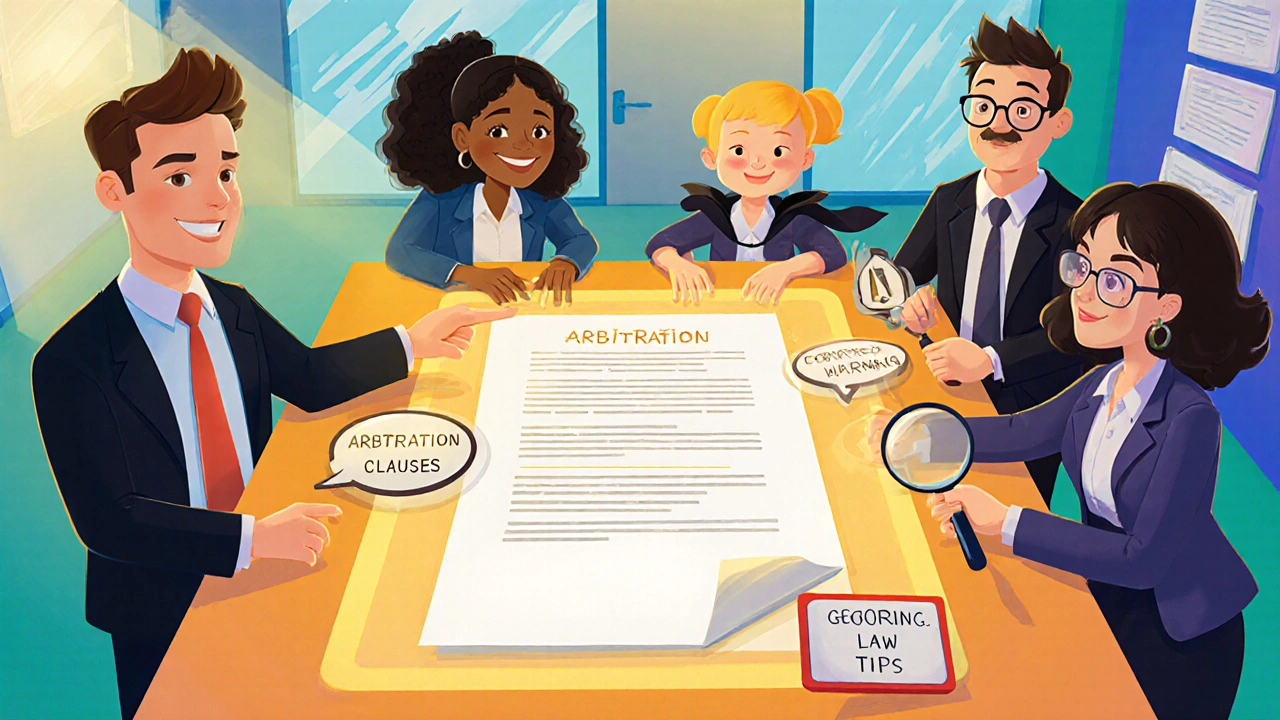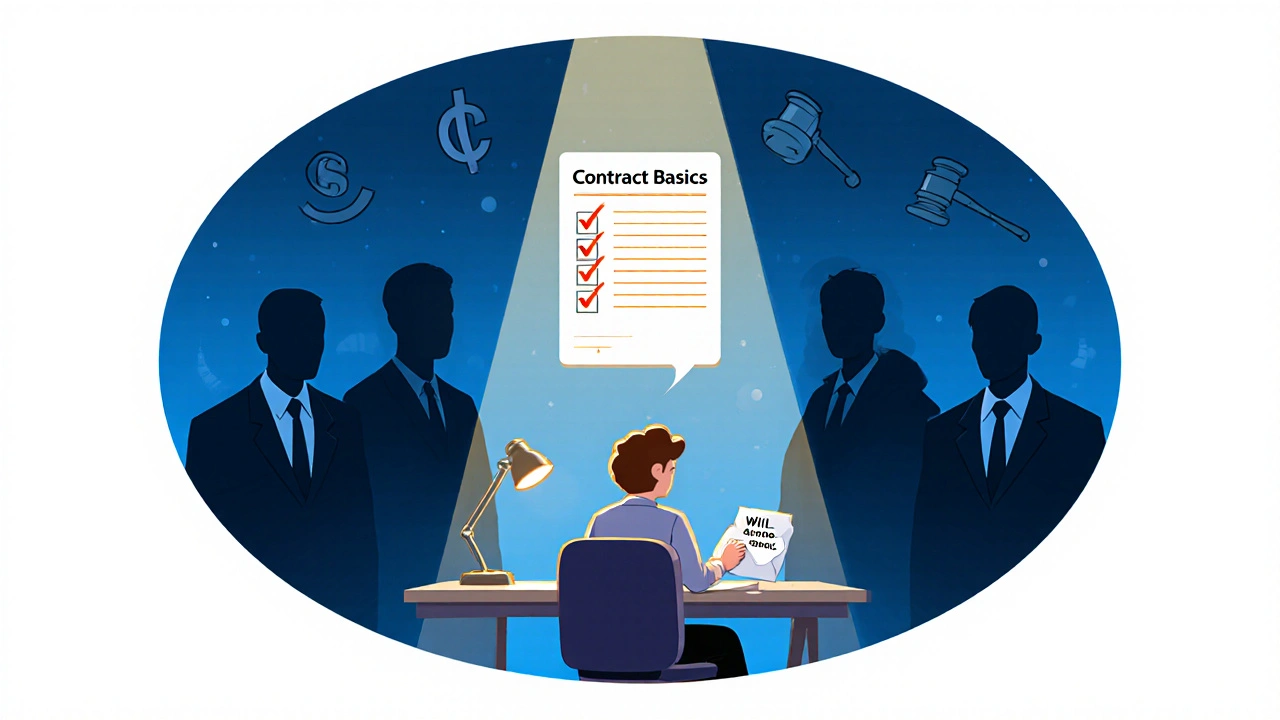Legal Compliance and Contract Training for Professionals: What You Need to Know Today
 Nov, 5 2025
Nov, 5 2025
Every year, over 60% of workplace lawsuits in the U.S. stem from avoidable contract misunderstandings or compliance failures. That’s not just a statistic-it’s a real risk for professionals who never got proper training. Whether you’re signing a vendor agreement, managing client deliverables, or approving internal policies, not knowing the legal basics can cost your company-and your career.
Why Legal Compliance Training Isn’t Optional Anymore
Compliance isn’t about filling out a checkbox during onboarding. It’s about understanding what you’re legally responsible for. In 2024, the EEOC reported a 22% increase in discrimination claims tied to managers who didn’t know how to handle accommodation requests properly. That’s not ignorance-it’s a training gap.
Companies aren’t just fined for violations. They lose trust. Employees quit. Clients walk away. And when a lawsuit hits, your personal reputation often takes a hit too-even if you weren’t the one who made the decision.
Real-world example: A project manager at a mid-sized tech firm approved a contract that didn’t include a data retention clause. Two years later, the client sued for improper handling of personal information. The manager didn’t know the contract needed that clause. They’d never been trained on what makes a contract legally enforceable. The company paid $1.2 million in settlements. The manager was let go.
What’s Actually in a Contract? (And What You Should Check)
Not all contracts look like thick legal documents. Sometimes they’re emails, signed PDFs, or even verbal agreements backed by text messages. Courts have ruled that all of these can be binding.
Here’s what every professional needs to look for before agreeing to anything:
- Parties involved: Are the names spelled right? Is the company name the legal entity, or just a trade name?
- Scope of work: What exactly is being delivered? Vague terms like "reasonable efforts" or "as needed" are red flags.
- Payment terms: When? How? What happens if payment is late? Is there a late fee clause?
- Termination rights: Can either side cancel? How much notice? Are there penalties?
- Liability limits: Are you personally on the hook? Most contracts include indemnification clauses-know what that means.
- Governing law: Which state’s laws apply? This matters if a dispute goes to court.
One marketing director I spoke with signed a contract without reading the arbitration clause. When a client sued, she had to pay $15,000 in legal fees just to get the case moved out of court. She didn’t know arbitration meant giving up her right to a jury trial.
Compliance Isn’t Just About Laws-It’s About Culture
Legal compliance isn’t only about contracts. It includes:
- Handling personal data under state laws like CCPA or CPRA
- Following wage and hour rules for remote workers across state lines
- Knowing when a conversation becomes harassment
- Documenting performance issues correctly to avoid wrongful termination claims
- Understanding when a gift or meal crosses the line into bribery
These aren’t theoretical. In 2023, a sales rep in Arizona was fired after accepting a $500 gift card from a vendor. The company’s policy said gifts over $25 required approval. He didn’t know the policy existed. His manager didn’t know to enforce it. The company had to pay $210,000 in back wages and legal fees.
Training needs to go beyond "here’s the policy." It needs to show you how to apply it. Role-playing scenarios work better than slides. Ask yourself: "What would I do if...?" Then test it.

How to Get Real Training (Not Just a Video You Skip)
Most companies offer compliance training through a boring LMS module. You click through it while checking your phone. It doesn’t stick.
Effective training has three things:
- Real examples: Not hypotheticals. Actual cases from your industry.
- Interactive Q&A: Not multiple-choice quizzes. Live discussions where you argue the right answer.
- Accountability: After training, you’re asked to sign off on a checklist: "I understand the risks in my role. I know who to ask if I’m unsure."
Some firms now use "contract walk-throughs"-you’re given a real (anonymized) contract from your company and asked to spot the issues. If you miss three or more, you get one-on-one coaching. It’s not punitive. It’s preventive.
And yes, this takes time. But how much time do you want to spend in a deposition?
What Happens When You Skip Training?
Let’s say you’re a freelance designer. You get a client who wants a logo, a website, and social media posts. You send a quick email: "Will do. $3,000. Delivery in 3 weeks."
That’s a contract. And if the client doesn’t pay? You can’t sue for breach of contract unless you can prove all the terms. Did you agree to revisions? What if they wanted the logo in 4 colors? What if they used your design on products you didn’t authorize?
Without training, you’re flying blind. You don’t know that:
- Oral agreements are enforceable
- Work-for-hire language must be written
- Copyright doesn’t automatically transfer unless specified
One freelancer lost $18,000 in unpaid work because the client claimed they "never agreed to the price." No written record. No training on how to document agreements.

Where to Find Good Training
You don’t need a law degree. But you do need resources that speak your language.
- Industry associations: The American Marketing Association, Project Management Institute, and SHRM all offer compliance modules tailored to their fields.
- Legal aid nonprofits: Many offer free webinars for small business owners and freelancers.
- Online platforms: Coursera and LinkedIn Learning have updated courses on contract law and compliance for 2025, including state-specific rules.
- Internal HR teams: If your company doesn’t offer training, ask for it. Frame it as risk reduction, not a favor.
Look for courses that include:
- Templates you can use (email scripts, contract checklists)
- State-specific updates (California, New York, and Washington have stricter rules than most)
- Updates from the last 12 months
Anything older than 2023 is outdated. Laws change fast.
Final Thought: This Is Your Career Insurance
Legal compliance and contract training isn’t about becoming a lawyer. It’s about protecting yourself from someone else’s mistake-or your own.
Think of it like car insurance. You hope you never need it. But if you do, you’ll be glad you had it.
Start small. Pick one contract you signed last month. Go back and read it line by line. Ask yourself: Did I understand every term? Could I explain it to my boss? If not, that’s your next training topic.
Compliance isn’t scary. It’s simple. You just have to learn it before it’s too late.
Do I need legal training if I’m not in HR or legal?
Yes. Almost every professional signs contracts, manages client agreements, or handles sensitive data. Even a marketing coordinator approving a vendor email or a sales rep offering a discount can trigger legal risk. You don’t need to be a lawyer-but you do need to know what’s legally binding and what’s not.
What’s the difference between compliance training and contract training?
Compliance training covers laws and regulations that affect your job-like anti-discrimination rules, data privacy, or wage laws. Contract training focuses specifically on understanding, drafting, and reviewing agreements. They overlap: a contract can violate compliance laws, and compliance rules often dictate what must be in a contract. Both are essential.
Can verbal agreements be legally binding?
Yes. Courts recognize verbal contracts if there’s evidence of mutual agreement, consideration (something of value exchanged), and intent to be bound. Text messages, emails, and even recorded calls can serve as proof. That’s why documenting everything is critical-even if you think it’s "just a quick agreement."
How often should professionals get updated compliance training?
At least once a year. But if you work in a regulated industry (healthcare, finance, government contracting) or handle personal data, you should get updates every 6 months. Laws like CCPA, GDPR, and state wage rules change frequently. What was compliant in 2023 may be illegal in 2025.
What if my company doesn’t offer training?
Take initiative. Use free resources from SHRM, the SBA, or your state’s labor department. Complete a course on Coursera or LinkedIn Learning and share it with your manager. Frame it as risk reduction: "I want to avoid mistakes that could cost the company money or reputation." Most managers will support that.
Can I be personally liable for contract mistakes?
Yes-if you sign a contract in your personal name, or if your actions are found to be grossly negligent or intentional. Most contracts protect employees acting in good faith under company authority. But if you ignore clear policies, falsify documents, or hide information, you can be held personally responsible. Training helps you avoid those traps.
Aafreen Khan
November 8, 2025 AT 07:40lol so now im supposed to read every email like its a legal contract? 🤦♀️ i signed a deal via text last week for a freelance gig and now im paranoid my cat typed "i agree" when she walked on my phone
Pamela Watson
November 9, 2025 AT 04:56you dont need training you just need to say no. if someone asks you to sign something you dont understand, say "i need to talk to my lawyer" and walk away. done. problem solved. why make it so complicated? 😒
michael T
November 10, 2025 AT 02:56THIS. I worked at a startup where the CEO had us sign NDAs on napkins. One guy got fired for leaking a "secret" that was literally scribbled in Sharpie on a coffee stain. The company sued him. He sued them back. Now both are bankrupt. And I still have nightmares about inkblots. 🤡
Christina Kooiman
November 10, 2025 AT 10:07First of all, "reasonable efforts" is NOT a red flag-it’s a standard legal term of art. Second, you misspelled "governing" as "govering" in your bullet list. Third, you use "you" too much. This reads like a blog post written by someone who’s never taken a law class. And fourth-why are you telling freelancers to use templates? That’s not training, that’s laziness. You’re not helping. You’re enabling.
Stephanie Serblowski
November 11, 2025 AT 23:34Okay but let’s be real-this is just corporate fear-mongering dressed up as "career insurance." 🤷♀️ I’ve been working in marketing for 12 years and never been sued. I’ve also never had compliance training. I just use common sense. Also, can we talk about how ridiculous it is that a $500 gift card got someone fired? Who even has that policy? 🙄
Renea Maxima
November 13, 2025 AT 04:56Is compliance really about protecting you-or about protecting the company from liability? We’re told to "learn the rules" but never asked if the rules are fair. What if the contract itself is unethical? What if the law is outdated? Training doesn’t make you wise. It makes you obedient.
Jeremy Chick
November 13, 2025 AT 21:13Bro. I work in sales. I sign 5 deals a week. Half of them are over Slack. I don’t read the fine print. I read the price and the deadline. If the client ghosts me, I invoice them. If they don’t pay? I send a lawyer letter. That’s it. Stop overcomplicating. You’re not a lawyer. You’re a human being with a job. Just do your damn job.
Sagar Malik
November 14, 2025 AT 13:31ah yes, the classic neoliberal compliance-industrial complex. You're being conditioned to internalize corporate liability as personal responsibility. The real issue? The legal system is rigged. Contracts are tools of domination. Training won't fix that. Only systemic collapse will. 🤖⚖️
Seraphina Nero
November 16, 2025 AT 09:19I just wanted to say thank you for writing this. I’m a junior project coordinator and I had no idea any of this mattered. I signed a contract last month without reading the arbitration clause. I was so embarrassed. But now I’m going to re-read it and ask HR for a copy of the policy. You made me feel less alone.
Megan Ellaby
November 18, 2025 AT 07:14sooo… if i send a text saying "ill do the design for $1k" and they say "cool thx"-is that a contract? because i did that last week and now im scared. also can someone explain what "work for hire" means? i think it means they own my soul? 😅
Rahul U.
November 19, 2025 AT 02:51From India here-our courts still struggle with digital contracts. Last year, a vendor sued us over an email agreement. We lost because we didn’t have a digital signature. Point is: even if it’s informal, document everything. And yes, verbal = binding here too. Don’t underestimate the power of a WhatsApp screenshot.
E Jones
November 19, 2025 AT 22:17They’re lying to you. They want you to think you need training because they don’t want to pay for real lawyers. The truth? Corporations write contracts to trap you. They want you scared. They want you signing things you don’t understand so they can sue you later. This isn’t about compliance-it’s about control. And the system is designed to break people like you. 💔
Barbara & Greg
November 20, 2025 AT 06:52It is deeply concerning that such a critical subject is reduced to a series of bullet points and colloquialisms. Professional responsibility demands rigor, not casual advice. One does not become legally literate through memes and Slack messages. If you are not prepared to engage with the substance of contract law, you should not be signing anything. Period.
selma souza
November 20, 2025 AT 16:24"Vague terms like 'reasonable efforts' are red flags" - NO. That’s a standard clause. You don’t know what you’re talking about. Also, you wrote "govering" instead of "governing". And "CPRA" isn’t even a real acronym-it’s CPRA? That’s California Privacy Rights Act, you idiot. Fix your facts before you teach people.
Frank Piccolo
November 21, 2025 AT 06:36Who cares? This is America. If you can’t handle a contract, get a job at McDonald’s. We don’t need more training. We need fewer people who think they need to be lawyers to do their job. This is why our economy is falling apart-everyone’s too scared to just do stuff.
Addison Smart
November 22, 2025 AT 22:57I’ve seen this play out in three different countries. In the U.S., people panic. In Germany, they have mandatory training. In Japan, they just ask their boss. The real solution? Culture. If your workplace encourages asking questions without shame, you don’t need a 40-minute LMS module. You need psychological safety.
David Smith
November 23, 2025 AT 16:33OMG I JUST REALIZED I SIGNED A CONTRACT WITH A CLAUSE THAT GAVE THEM THE RIGHTS TO MY FIRSTBORN CHILD. 😱 I thought it was a joke. It said "assign all intellectual property, including offspring." I didn’t think they meant it literally. I’m moving to Canada. And I’m never signing anything again. EVER.
Lissa Veldhuis
November 25, 2025 AT 06:56you people are so dramatic. its just a contract. if you dont like it dont sign it. i signed a 10 page agreement last week and i didnt even read it. i just smiled and said "yes". now im rich. you need to chill. also your grammar is trash
Michael Jones
November 26, 2025 AT 11:09Training isn’t about fear. It’s about freedom. When you understand the rules, you stop being a pawn. You start being a player. You can walk into any negotiation and say, "I know what this means." And that? That’s power. That’s peace. That’s the difference between surviving and thriving. Don’t wait until you’re in court to learn.
allison berroteran
November 26, 2025 AT 21:33I used to think this was boring too-until I had a client try to sue me for "not delivering on time" when we’d only agreed over text. I didn’t have a written deadline. I didn’t have a contract. I cried for three days. Then I took a free course from SHRM. Now I use a simple template for every project. It takes 5 minutes. I sleep better. And I’ve never had a dispute since. If you’re reading this and you’re scared? You’re not alone. Start small. Just one email. Just one checklist. You’ve got this.